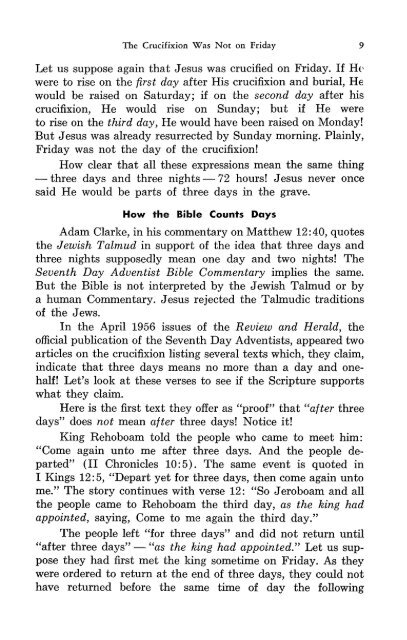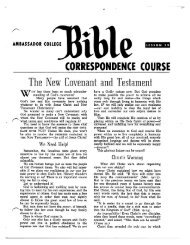Crucifixion Was Not on Friday (1968)_b.pdf - Herbert W. Armstrong
Crucifixion Was Not on Friday (1968)_b.pdf - Herbert W. Armstrong
Crucifixion Was Not on Friday (1968)_b.pdf - Herbert W. Armstrong
Create successful ePaper yourself
Turn your PDF publications into a flip-book with our unique Google optimized e-Paper software.
The <str<strong>on</strong>g>Crucifixi<strong>on</strong></str<strong>on</strong>g> <str<strong>on</strong>g>Was</str<strong>on</strong>g> <str<strong>on</strong>g>Not</str<strong>on</strong>g> <strong>on</strong> <strong>Friday</strong> 9<br />
Let us suppose again that Jesus was crucified <strong>on</strong> <strong>Friday</strong>. If H(\<br />
were to rise <strong>on</strong> the first day after His crucifixi<strong>on</strong> and burial, He<br />
would be raised <strong>on</strong> Saturday; if <strong>on</strong> the sec<strong>on</strong>d day after his<br />
crucifixi<strong>on</strong>, He would rise <strong>on</strong> Sunday; but if He were<br />
to rise <strong>on</strong> the third day, He would have been raised <strong>on</strong> M<strong>on</strong>day!<br />
But Jesus was already resurrected by Sunday morning. Plainly,<br />
<strong>Friday</strong> was not the day of the crucifixi<strong>on</strong>!<br />
How clear that all these expressi<strong>on</strong>s mean the same thing<br />
- three days and three nights - 72 hours! Jesus never <strong>on</strong>ce<br />
said He would be parts of three days in the grave.<br />
How the Bible Counts Days<br />
Adam Clarke, in his commentary <strong>on</strong> Matthew 12:40, quotes<br />
the Jewish Talmud in support of the idea that three days and<br />
three nights supposedly mean <strong>on</strong>e day and two nights! The<br />
Seventh Day Adventist Bible Commentary implies the same.<br />
But the Bible is not interpreted by the Jewish Talmud or by<br />
a human Commentary. Jesus rejected the Talmudic traditi<strong>on</strong>s<br />
of the Jews.<br />
In the April 1956 issues of the Review and Herald, the<br />
official publicati<strong>on</strong> of the Seventh Day Adventists, appeared two<br />
articles <strong>on</strong> the crucifixi<strong>on</strong> listing several texts which, they claim,<br />
indicate that three days means no more than a day and <strong>on</strong>ehalf!<br />
Let's look at these verses to see if the Scripture supports<br />
what they claim.<br />
Here is the first text they offer as "proof" that "after three<br />
days" does not mean after three days! <str<strong>on</strong>g>Not</str<strong>on</strong>g>ice it!<br />
King Rehoboam told the people who came to meet him:<br />
"Come again unto me after three days. And the people departed"<br />
(II Chr<strong>on</strong>icles 10:5). The same event is quoted in<br />
I Kings 12: 5, "Depart yet for three days, then come again unto<br />
me." The story c<strong>on</strong>tinues with verse 12: "So Jeroboam and all<br />
the people came to Rehoboam the third day, as the king had<br />
appointed, saying, Come to me again the third day."<br />
The people left "for three days" and did not return until<br />
"after three days" - "as the king had appointed." Let us suppose<br />
they had first met the king sometime <strong>on</strong> <strong>Friday</strong>. As they<br />
were ordered to return at the end of three days, they could not<br />
have returned before the same time of day the following

















